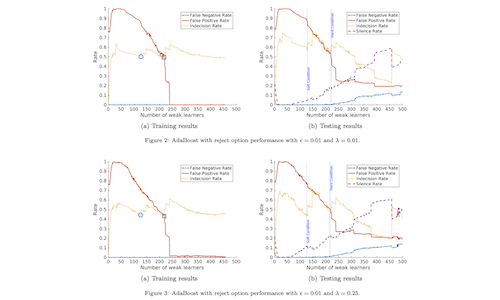[Android App] PMA docent
An android audio guide app for Philadelphia Museum of Arts (PMA)  Read more
Read more
An android audio guide app for Philadelphia Museum of Arts (PMA)  Read more
Read more
An android app managing watching history  Read more
Read more
Silence false SpO2 alarms using adaboost with reject option Read more
Read more
Confidence Calibration using Lossy Label-Invariant Transformation Read more
Read more
Covariate shift detection in a sequential setting Read more
Read more
Published in Smart Health, 2018
Alarm fatigue has been increasingly recognized as one of the most significant problems in the hospital environment. In this paper, we propose a robust classification procedure based on the AdaBoost algorithm with reject option that can identify and silence false SpO2 alarms, while ensuring zero misclassified clinically significant alarms. Read more
Download here
Published in Journal of Diabetes Research, 2021
Nocturnal hypoglycemia is life threatening for individuals with type 1 diabetes (T1D) due to loss of hypoglycemia symptom recognition (hypoglycemia unawareness) and impaired glucose counter regulation. These individuals also show disturbed sleep, which may result from glycemic dysregulation. The purpose of this study was to describe long-term changes in glycemic control and objective sleep after initiating hybrid closed loop (HCL) insulin delivery in adults with type 1 diabetes and hypoglycemia unawareness. Read more
Download here
Published in International Conference on Artificial Intelligence and Statistics (AISTATS), 2021
Providing reliable model uncertainty estimates is imperative to enabling robust decision making by autonomous agents and humans alike. In this paper, we present the recursive lossy label-invariant calibration (ReCal) technique that leverages label-invariant transformations to recursively group (and calibrate) inputs. We show that ReCal outperforms other calibration methods on multiple datasets, especially, on large-scale datasets such as ImageNet. Read more
Download here
Published in International Conference on Machine Learning (ICML), 2022
A standard assumption in supervised learning is that the training data and test data are from the same distribution. However, this assumption often fails to hold in practice, which can cause the learned model to perform poorly. We consider the problem of detecting covariate shift, where the covariate distribution shifts but the conditional distribution of labels given covariates remains the same. Read more
Download here
Published in Diabetes Technology and Therapeutics, 2023
Automated insulin delivery (AID) may benefit individuals with long-standing type 1 diabetes where frequent exposure to hypoglycemia impairs counterregulatory responses. This study assessed the effect of 18 months AID on hypoglycemia avoidance and glucose counterregulatory responses to insulin-induced hypoglycemia in long-standing type 1 diabetes complicated by impaired awareness of hypoglycemia. Read more
Download here